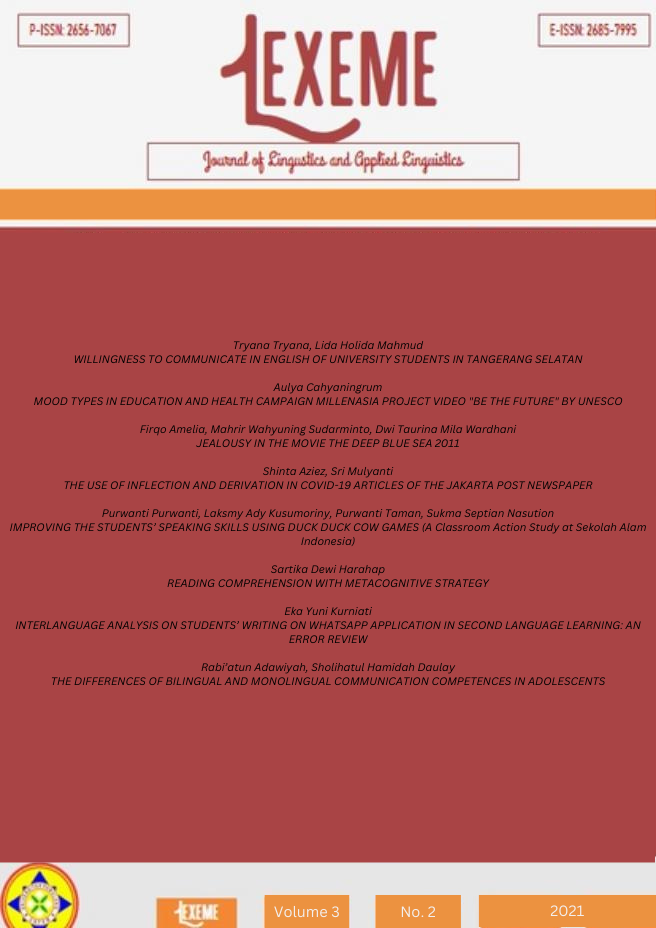THE DIFFERENCES OF BILINGUAL AND MONOLINGUAL COMMUNICATION COMPETENCES IN ADOLESCENTS
DOI:
https://doi.org/10.32493/ljlal.v3i2.18722Keywords:
Bilingual, communication competency, monolingual, teenagersAbstract
Communication competence is essential for teenagers’ adaptation and affected by how teenagers used their language in daily communication. This research aimed to identify the difference of communication competency between bilingual teenagers and monolingual teenagers. The type of this research was quantitative with comparative purpose. The population of this research was the young teenagers in Medan. Research’s samples were students of SMAIT Bunayya as monolingual teenagers and students of MA Taruna Qur’an as bilingual teenagers. The number of sample in this research was 20 students; 10 bilingual students and 10 monolingual selected using the method of simple random sampling. The measuring instruments used in the form of communication abilities’ scale was based on the components of communicative competency proposed by Spitzberg and Cupach (in Greene & Burleson, 2003; Payne, 2005), namely knowledge, motivation, and skill. The result of data research using independent sample t-test showed that there was a difference of communication competency between bilingual and monolingual teenagers, especially on knowledge and motivation. As a matter of discussion, this research was conducted in the setting of a still monolingual society.
References
Arias, R. & Lakshmanan, U. (2005). Code Switching in a Spanish-English Bilingual Child: A Communication Resource. Journal of ISB4: Proceedings of the 4th International Symposium on Bilingualism, ed. James Cohen, Kara T. McAlister, Kellie Rolstad, and Jeff MacSwan, 94-109. Somerville, MA: Cascadilla Press.
Baker, C. (2001). Foundations of Bilingual Education and Bilingualism. Third Edition. Clevedon.Boston. Toronto. Sydney: Multilingualmatters Ltd.
Bialystok, E. (2003). Bilingualism in Development. New York: Cambridge University Press.
Caldas, S. J. (2006). Raising BilingualBiliterate Children in Monolingual Cultures. Clevedon.Buffalo. Toronto : MultilingualMatters Ltd.
Esch, E.H. & Riley, P. (2003). The Bilingual Family: A Handbook for Parents. New York: Cambridge University Press.
Greene & Burleson, 2003; Payne, 2005. The measuring instruments used in the form of communication abilities’ scale was based on the components of communicative competency proposed by Spitzberg and Cupach
Lumintaintang, Y.B.M. (2009). Bahasa Negara, Bahasa Nasional. [On-Line]. Available FTP: <http://www.lpds.or.id/index.php?option=com_content&view=article&id=23:bahasa-negara-bahasa-nasional&catid=3:bahasamedia & Itemid=22>..
Meuter, R. F. I & Allport, A. (1999). Bilingual Language Switching in Naming: Asymmetrical Costs of Language Selection. Journal of Memory and Language. Vol 40: 25–40. Article ID jmla.1998.2602 [On-line series]. Available FTP.
Raguenaud, V. (2009). Bilingual by Choice, Raising Kids in Two (or more!) Languages. Boston: Nicholas Brealey Publishing.
Rickheit, G. & Strohner, H. (2008). Handbook of Communication Competence. Berlin: Mouton de Gruyter.
Salleh, L.M. (2006). Communication Competence: A Malaysian Perspective. Journal of Human Communication. Vol. 11 No. 3 : 303- 312 [On-line series]. Available FTP
Saunders, G. (1988). BilingualChildren: From Birth to Teens. Clevedon. Philadelphia: Multilingualmatters Ltd.
Sarinah., Azhar A., (2010), Hubungan Komunikasi Interpersonal dan Komitmen terhadap Organisasi dengan Kepuasan Kerja Karyawan PT. Perkebunan Nusantara III (PERSERO), Analitika: 2 (2): 63-75
Simorangkir, N.R., Asih M., Azhar A., (2014) Kontribusi Komunikasi Persuasif Guru Terhadap Kepercayaan Diri Dan Motivasi Belajar, Analitika: 6 (2): 60
Siregar, C.Y., Suryani H., (2013) Hubungan Komunikasi Interpersonal dan Persepsi Pengembangan Karir dengan Kepuasan Kerja, Analitika: 5 (1): 11- 17Soler, E. A., & Jorda, M. P. S. (2007). Intercultural Language Use and Language Learning. Netherlands: Springer.
Zulhafni, S.H., (2011), Hubungan Antara Iklim Organisasi dan Komunikasi Interpersonal dengan Perilaku Agresif pada Anggota Satuan Reserse Kriminal POLDA Sumatera Utara, Analitika: 3 (1): 1-10







